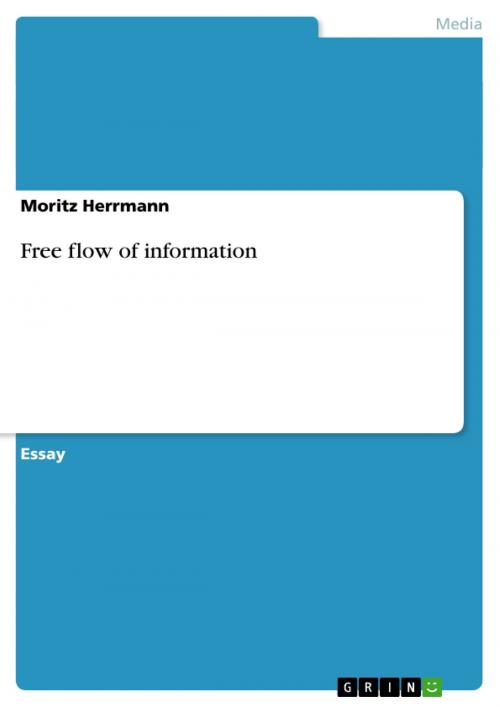| Author: | Moritz Herrmann | ISBN: | 9783640928910 |
| Publisher: | GRIN Verlag | Publication: | May 31, 2011 |
| Imprint: | GRIN Verlag | Language: | English |
| Author: | Moritz Herrmann |
| ISBN: | 9783640928910 |
| Publisher: | GRIN Verlag |
| Publication: | May 31, 2011 |
| Imprint: | GRIN Verlag |
| Language: | English |
Essay from the year 2010 in the subject Communications - Media and Politics, Politic Communications, grade: 1,7, Manipal University (Manipal Institute of Communication), course: Global Communication, language: English, abstract: Every age has its own dreams and ideals. In our time, the global network society is at the very front of utopias. The joyous spirit of informalism, going hand in hand with free markets, open horizons and communication without any borders - what a world this would be! Amongst all concepts that could contribute massively to this goal, one stands out: the 'free flow of information'. Supposedly a good thing, it has been controversial ever since, though. Not in terms of general approval that information should be free and accessible for everyone but in the light of different political ideologies. The west understands 'free flow of information' as lack of government controls, while the so-called 'Third World' as well as some states of the former Soviet Union and others stress a 'balanced and unbiased' flow to and from the Third World. In between these opinions, well-known organizations such as UN and UNESCO try to negotiate, helped by non-governmental instances. In order to critique this 'flow of information' more purposefully, I thought of a few questions I'd like to find answers to while examining the whole concept. The questions are: How much is the policy shaped by the rituals of the mass media? Why are politicians so keen and intense about being reporting on in the electronic media, the talk shows, the news? Is there some kind of 'resistance of the political', in a way that the traditional decision-making and communication patterns happens but is only overshadowed by the excitement of the actual journalism? Do politicians want to be protected from the mass-media spectacle at all - and, if so, how can they, really? Finally, how can the political class force their way of reporting on the journalists and news agencies?
Essay from the year 2010 in the subject Communications - Media and Politics, Politic Communications, grade: 1,7, Manipal University (Manipal Institute of Communication), course: Global Communication, language: English, abstract: Every age has its own dreams and ideals. In our time, the global network society is at the very front of utopias. The joyous spirit of informalism, going hand in hand with free markets, open horizons and communication without any borders - what a world this would be! Amongst all concepts that could contribute massively to this goal, one stands out: the 'free flow of information'. Supposedly a good thing, it has been controversial ever since, though. Not in terms of general approval that information should be free and accessible for everyone but in the light of different political ideologies. The west understands 'free flow of information' as lack of government controls, while the so-called 'Third World' as well as some states of the former Soviet Union and others stress a 'balanced and unbiased' flow to and from the Third World. In between these opinions, well-known organizations such as UN and UNESCO try to negotiate, helped by non-governmental instances. In order to critique this 'flow of information' more purposefully, I thought of a few questions I'd like to find answers to while examining the whole concept. The questions are: How much is the policy shaped by the rituals of the mass media? Why are politicians so keen and intense about being reporting on in the electronic media, the talk shows, the news? Is there some kind of 'resistance of the political', in a way that the traditional decision-making and communication patterns happens but is only overshadowed by the excitement of the actual journalism? Do politicians want to be protected from the mass-media spectacle at all - and, if so, how can they, really? Finally, how can the political class force their way of reporting on the journalists and news agencies?















